Initially trusted by Frog Capital to conduct due diligence, as part of the Series A investment round our role then transferred into that of an interim CMO post-investment. During this time we conducted a thorough repositioning of the brand to support the growth ambitions of the business and new investors, whilst helping to build the team and recruit a permanent CMO.
“We’ve been working with Talisman Sparro for over a year now, and they have become an integral part of the Clue team. Initial engagement was to develop a high level marketing strategy to support us through our investment round and prepare for the scale up journey. The output highlighted the potential for Clue, swiftly progressing into a brand programme and a series of workstreams which included an interim CMO role. I have personally enjoyed building a positive relationship with the team and it’s been a really collaborative and productive process that has bought the whole business together and gives us a fantastic platform for global growth.”
Clare Elford – CEO
Brand Strategy
Stakeholder Engagement
Brand Identity
Brand Guidelines
Collateral Development
Marketing Strategy
Beet It Sport is the most trusted natural supplement of the worlds sporting elite. It is backed by science and has been used in over 300 published medical and sports performance research papers.
They have carved out a space for themselves as the go-to brand for elite athletes and sports nutritionists, but their performance enhancing product range is equally effective for aspirational and recreational sports consumers – and they could see that this was a rapidly growing market.
With several well-known brands already in play, Beet It Sport knew that they needed a brand identity refresh and packaging re-design to help upweight their sports credentials and really own the benefits of Beetroot’s natural nitrates.
“This is such a unique product, being both natural and scientifically proven. So, a key challenge for this sports packaging design refresh was to strike the right balance. The final design truly embraces Beetroot whilst incorporating cues from the sports category which ensures consumers know this is a serious sports nutrition product they can trust.” Rikki Payne. Creative Strategist at Episode Two creative design agency
We are absolutely delighted to announce that Wilkinson Sword has chosen Activation to create their in-store activation campaign for 2023.
Wilkinson Sword is an iconic British brand with a heritage spanning over 250 years, and we were thrilled when they decided to move forward with our striking campaign idea, “No More Hairy Moments”. The campaign launches in stores in January 2023, after extensive development through 2022, and will run throughout the year.
The “No More Hairy Moments” creative platform is purposefully bold, brave, and disruptive to seek attention when it matters. Its goal is to make Wilkinson Sword relevant in situations/events where they would not generally be linked and stand out in these moments in stores.
The creative is unlike anything the brand has done before. The goal is to draw customers’ attention both in-store and online, encouraging them to purchase Wilkinson Sword products and enter the promotion.
This year-long campaign will come to life across many key seasonal events, including Valentine’s Day, Easter, Halloween and more, across multiple retailers. Each activation highlights a ‘hairy moment’ that the customer might want to escape from and we have partnered with travel brand Secret Escapes to provide the perfect prize. Each activation offers up to 5 entrants the chance to win £1,000 worth of Secret Escapes credits to plan their ideal escape.
The campaign kicked off in ASDA stores where customers have the opportunity to escape the New Year’s resolutions. ASDA shoppers can see the campaign both in store and online and enter the competition via www.asda.com/win. Future activations will be available across the major grocery and high street retailers so keep an eye out!
Building communities of global thinkers and explorers around the world, Bayswater combines two of life’s greatest adventures: education and travel. Bayswater is an international educational provider on a mission to educate and inspire the next generation through a life-changing educational experience.
Following their acquisition of Eurocentres – a renowned language school, and opening new campuses in locations around the world, Bayswater approached Fiasco Design with the brief to capture their progressive outlook on education; to challenge the status quo; and design a visual brand that is fit for the expansion of the business.
“We were tasked with developing an identity that is dynamic, progressive and optimistic, a fresh take for an educational brand. Harnessing the spirit of adventure, the brand idea celebrates travel and Bayswater’s global community.” – Ben Steers, Co-founder and Creative Director, Fiasco Design.
A suite of bold, colourful patterns are the backbone of the visual identity, reflecting the vibrant and diverse community taking a bold leap into new experiences. Whilst the brand palette and typographic system works to capture the aspirational and energetic tone of the brand.
The logo with its coloured pathways represents students of different backgrounds following their own unique pathway; uniting in the Bayswater community to be a part of something greater.
Typeface Fann Grotesque helps to ground the playful visual identity, giving the brand name a characterful, yet trustworthy feel. A reassuring nod to parents.
Meanwhile, photography is intended to feel active and optimistic. Celebrating individual personalities, the imagery is inclusive of a diverse global community of students.
The end result is a spirited brand that inspires the next generation to embark on the educational adventure of a life-time.
“We established Bayswater in 2017, but after rapid expansion and the integration of a variety of legacy industry brands, we wanted a reset and to double down on the Bayswater name with an exciting new brand canvas. It’s been great working with Fiasco on our full rebrand. We have appreciated the process, it’s been very collaborative and it’s very exciting to see the new look come to life across so many different platforms and formats.” – Stephan Roussounis, Founder and Managing Director, Bayswater.
You can read the full case study here.
As 2022 draws to a close we’re delighted to be ending the year with top-line growth of +40%. We’ve welcomed major new clients and projects including, Bristol Innovations, Loughborough School of Business & Economics, premium plant-based nutrition brand Vivo Life, Made Smarter Innovation, Medi-Tech innovator Radii Devices and law firm TLT.
We moved to a new home in Engine Shed in March, the natural location for our focus on scaling innovative organisations. From here we continue to support leadership teams in this enterprising region which recorded an investment flow of £1.1bn in 2021 – putting it into the top 20 in Europe.
Moving into 2023, we’ll continue to work alongside The University of Bristol, developing its commercial quantum offering, The Enterprise Sessions and other projects.
And our ongoing relationship with Vittoria, the world’s most advanced bicycle tyre company, has also flourished and we’ll continue to support the leadership team on global brand development. Notable achievements this year include supporting the launch of the 5-hectare Vittoria Park next to the brand’s HQ in Brembate Italy and advertising projects including the benchmark-busting OWN THE UNKNOWN campaign which brought about a collaboration with the Velosolutions team and percussionist Ian Chang.
We also captured the spirit of the brand for internal and external audiences with their Manifesto film.
“It’s been a fantastic year for Firehaus. We’ve worked with some inspirational people throughout 2022 who have maintained a visionary approach to the role of their organisation – even in these difficult times. Each of them is changing the world for the better and it’s great supporting them in that endeavour. We’re super-excited about what’s to come!”
Ian Bates – Founder and Creative Partner
Your brand – you’ve spent years getting it to the exact place you want it to be in and now it’s there, in that perfect position in your market. Your audience can now make an informed, rational decision on your brand. Everything’s perfect.
Except, it isn’t perfect. And your audience won’t make a rational decision.
Let’s take a step back for a minute. It has become increasingly accepted that your brand is no longer simply your logo, or visual identity, but is more about the experience or environment linked to your business, product or service. Your brand can no longer be considered a vehicle through which to facilitate a desired transaction, from business to consumer. It shouldn’t even be considered the sole property of the business it is associated with.
Your brand is shaped by the relationships formed in that space in-between business and people, and importantly between people themselves. It is in this acknowledgement of brand being about relationships that we must appreciate two key points:
no relationship remains the same – relationships always evolve
no-one wants to be in a relationship with someone perfect
In order to have healthy relationships you need to appreciate that people will not seek to understand your brand intellectually. Decisions are very often not made intellectually but intuitively. What is important isn’t what people know about a brand, but what they feel about a brand.
Evolution
Consider a personal relationship that may well be close to your heart – you and your mum. In one way your relationship with your mum will always remain the same, she is your mum and you are her child. That will never change. However, is that really your relationship, or is that simply a label?
Let’s consider the actual relationship you have with your mum over a lifetime. If we think about the relationship rather than the label we can see how our roles and expectations are constantly evolving. At birth we are totally dependent on our mum, without her we would die. As we grow into childhood we are nurtured by mum, but we are becoming less dependent. As older children / young adults we challenge mum, pushing for independence. Entering adulthood we become friends and equals with mum, still getting support and guidance but being able to share some of our own guidance. As mum ages we find that the dependency role switches, with mum becoming reliant on us and relying on our support. Throughout our life we remain mum and child, but the relationship is constantly evolving.
When considering your brand be aware that your relationship with people will evolve. Be open to changing roles and expectations.
Perfection
So what about perfection? Well, how would you like to be in a relationship with someone who is perfect? Someone who never does anything wrong, is always right, always the best, infallible. Sounds pretty awful right? Of course it does because we know that no-one is perfect, we all make mistakes and bad decisions. That’s not a bad thing though, it is what makes us likeable. It’s what builds relationships as everyone is fallible, we are all prone to mistakes. ‘To err is human’.
So if you are hoping to build a relationship with people through brand then forget about trying to seem perfect. We are all fallible and prone to mistakes, but what that gives is the opportunity to show growth, improvement, self-awareness. Perfection leaves no room for improvement – it is a dead state. Forget perfection.
The Space In-Between
When considering your brand, consider it the ‘space in-between’. Your brand is the space in-between numerous contributing factors, such as your business, staff, product, visual identity, customers, detractors, the current environment.
This ‘space in-between’ must be a space of vitality, of evolution, of imperfection, if you want people to relate to the brand and the brand to remain relevant. This ‘space in-between’ is not static or stagnant, it is always in-process. It should be considered temporally rather than spacially. It will most often be appreciated and experienced intuitively not intellectually. When considering your brand – the ‘space in-between’ – it’s not rational, it’s emotional.
Contributed by Paul Bailey Strategy Director Halo
For over 20 years, I’ve been working in or running my own branding agency. First design side, and then moving strategy side, I’ve learned a thing or two in my time. However, there is one thing which I seem to learn but then need to relearn again and again, and that is the need for and the role of transparency.
Now, what has led me to relearning the need for transparency you might ask? Well, in my current role I am Brand Strategy Director. This means I’m not only responsible for the brand strategy work with clients, nor does it mean I’m only responsible for the rest of our strategy team. No, what I take this role to mean is that I am responsible for the understanding and application of brand strategy from the whole of the agency.
As a full-service agency, we have people doing all sorts of roles, from design, to development, to client partnerships. Everyone will, at some point, work with the strategy team on projects, and so I believe that the more they can understand strategy the better and more effective our agency’s work will be. Now, of course, in meetings people get a little window into what we do in strategy, but I realized that in order to really make the strategy teams work transparent I needed to find ways to open up our working. So, I decided that I would decorate the walls with some of the models and frameworks that we might use in a project. (See above)
Models and frameworks seem to be either loved or loathed by strategists, but the use of a good one can create much needed focus at a critical point in a project.
The thing about them is, they’re not intended to give you an answer. In fact, even the best use of the smartest model only ever gives you an approximation of the answer. But for me, that is fine, because in strategy there is never really an answer, there’s just one of a number of answers.
So, I looked through the models I’ve used over the years, printed out some of the best and most used ones, and stuck them on the wall. This immediately led to some great feedback and some very interested people passing our strategy area. Conversations about models, their uses and application, and what they would be useful for, flowed freely. You see, once you put your ways of working out there, people are invested and interested.
In a project, models should be used as your hidden secret. We use them to create focus from a wide range of inputs, but we rarely show them to clients. They’re not really the best way to present work, so we use them as a tool for focusing our work, not presenting it. Good models should be used to cut, to hone, to give you less and not more.
Now there are many models I no longer use, they no longer meet my standards and have been dropped. As I said previously, I’ve spent over 20 years doing this, and one of the things I have learned is what models work, and which ones don’t. So, here’s a short list of a few of the models I still use, and what I use them for.
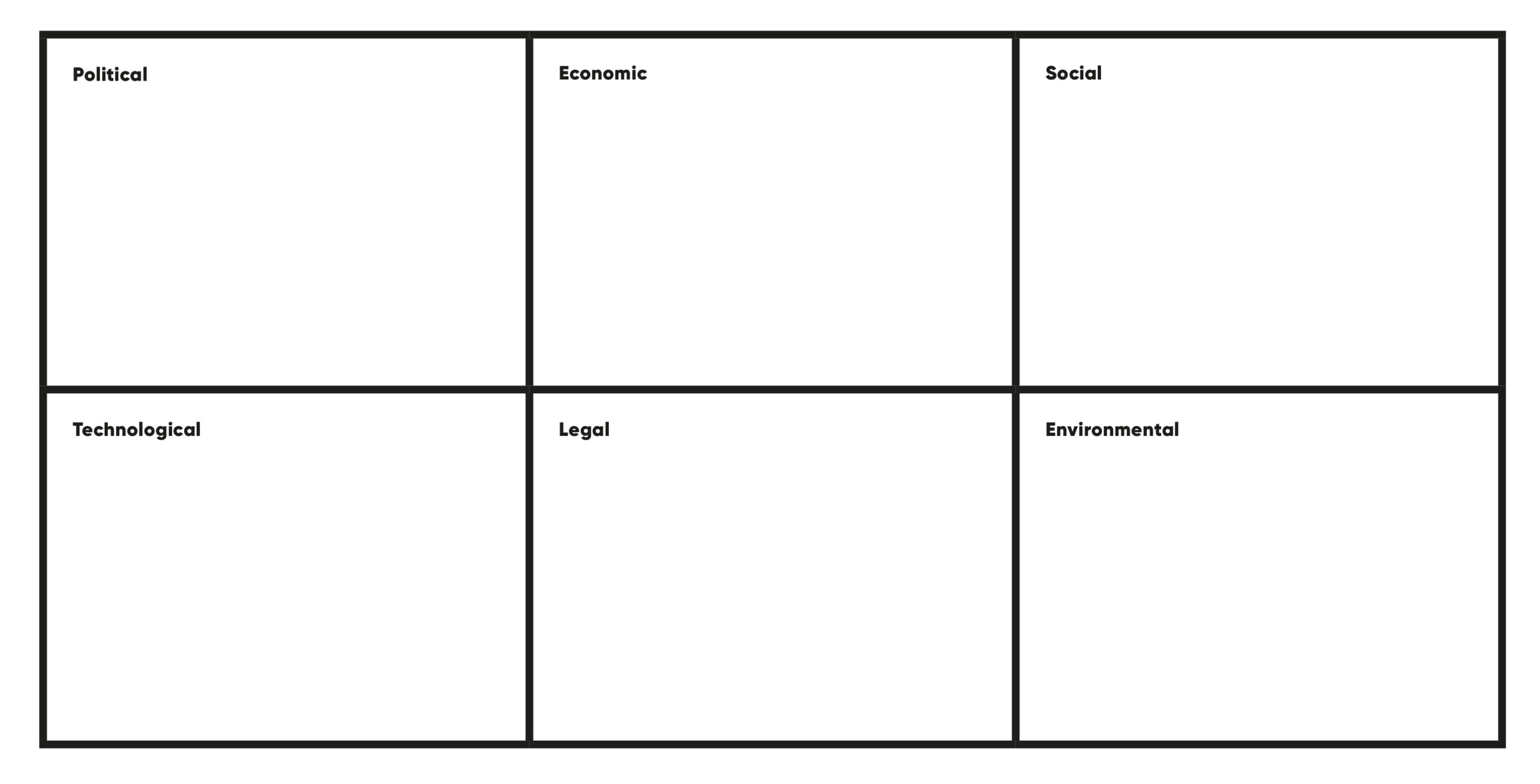
1. PESTLE
This model is old, and many people knock it, but I still use it. Why I use it is I find it a simple and helpful structure to work through one of the aspects of the context within which our brand exists – market forces. The six areas the PESTLE name stands for (Political, Economic, Social, Technological, Legal, Environmental) are still a good way to break down the market forces at play on a business and its associated brand. I find that they help me focus, but also they give an indication as to the areas in which a business has more to think about.
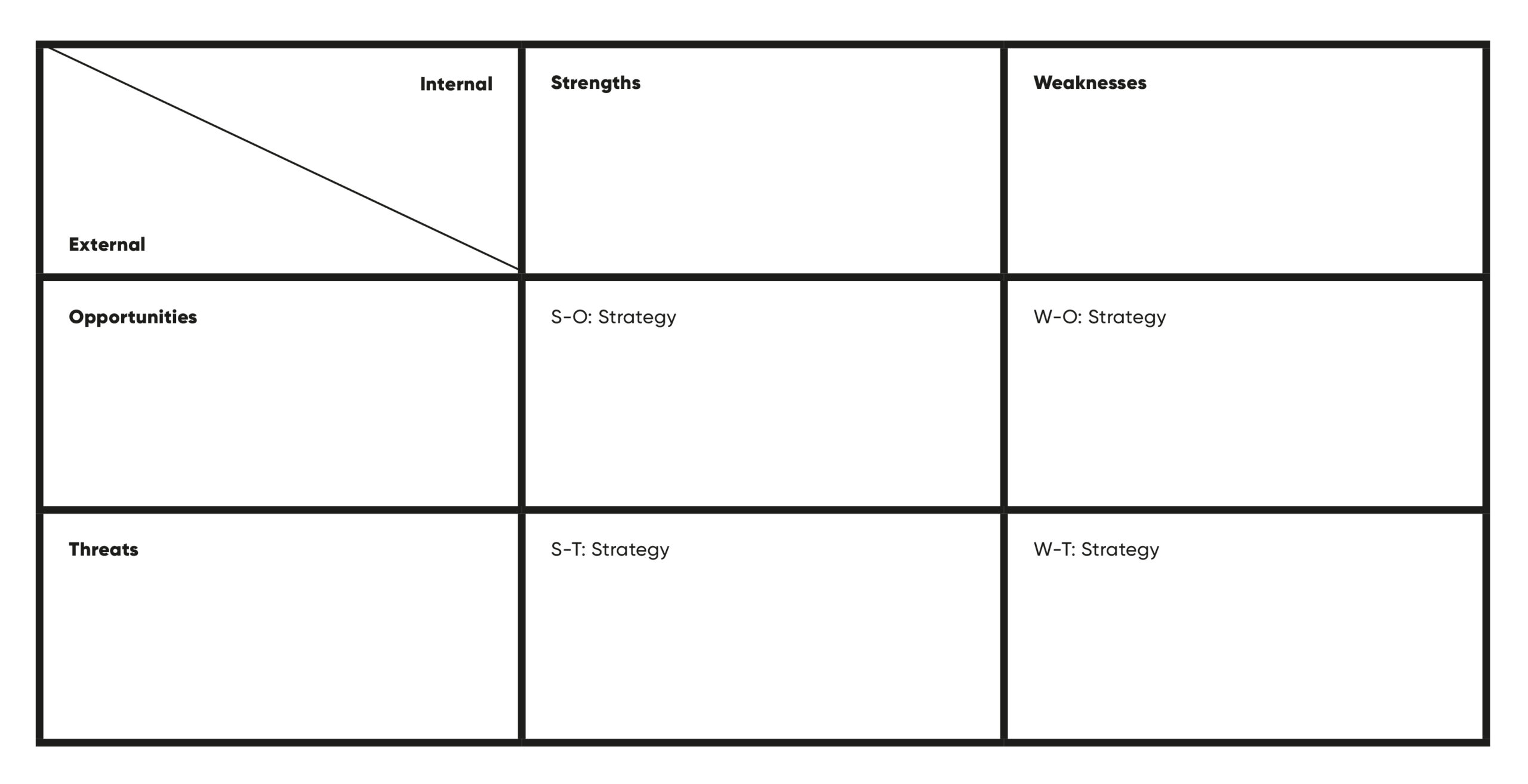
2. SWOT
Yet again, another old model that doesn’t get much love these days. Well, I still love it. When we are researching a brand project there are two key areas we need to find out about – the context (market forces, audience, competition) but also the business itself. The SWOT gives us a very simple model to learn something of what the business is good and bad at, and where they see opportunities and threats. Now, the slight variation in my model is that I use a grid which sets out the strengths and weaknesses, and the opportunities and threats on the outer edges, but on the inside where they cross over there are four panels where you can start to set out strategies for improvement (S-O, S-T, W-O, W-T).
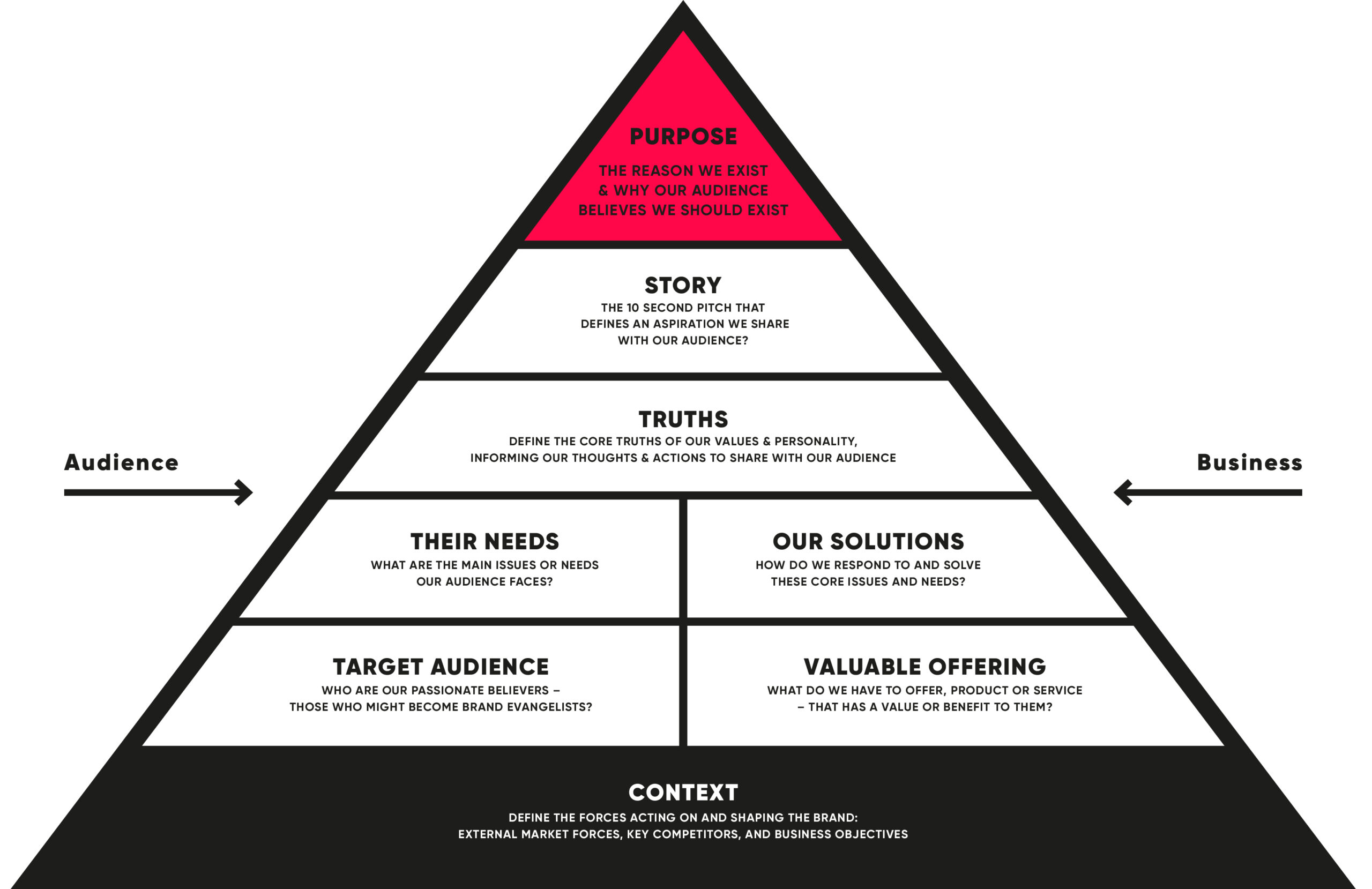
3. Brand Pyramid
Now I don’t think I’ve ever shown this as a pyramid to a client. The reason I find the pyramid useful is that it mirrors the process I go through mentally to try and reach a core brand proposition. At the base of the pyramid is the context within which the brand exists (market forces, audience, competitors). The wider this base is (the more research we can do at this stage) then the more stable the pyramid will be. Diagnosis of the context of a brand is the foundation of a good brand proposition. At the other end of the pyramid is the point, the tip, the core proposition that encapsulates the core value of the brand to its audience. You might manage to get this down to only a few words, or at most a sentence or two, because this should be the distillation of all of your work so far.
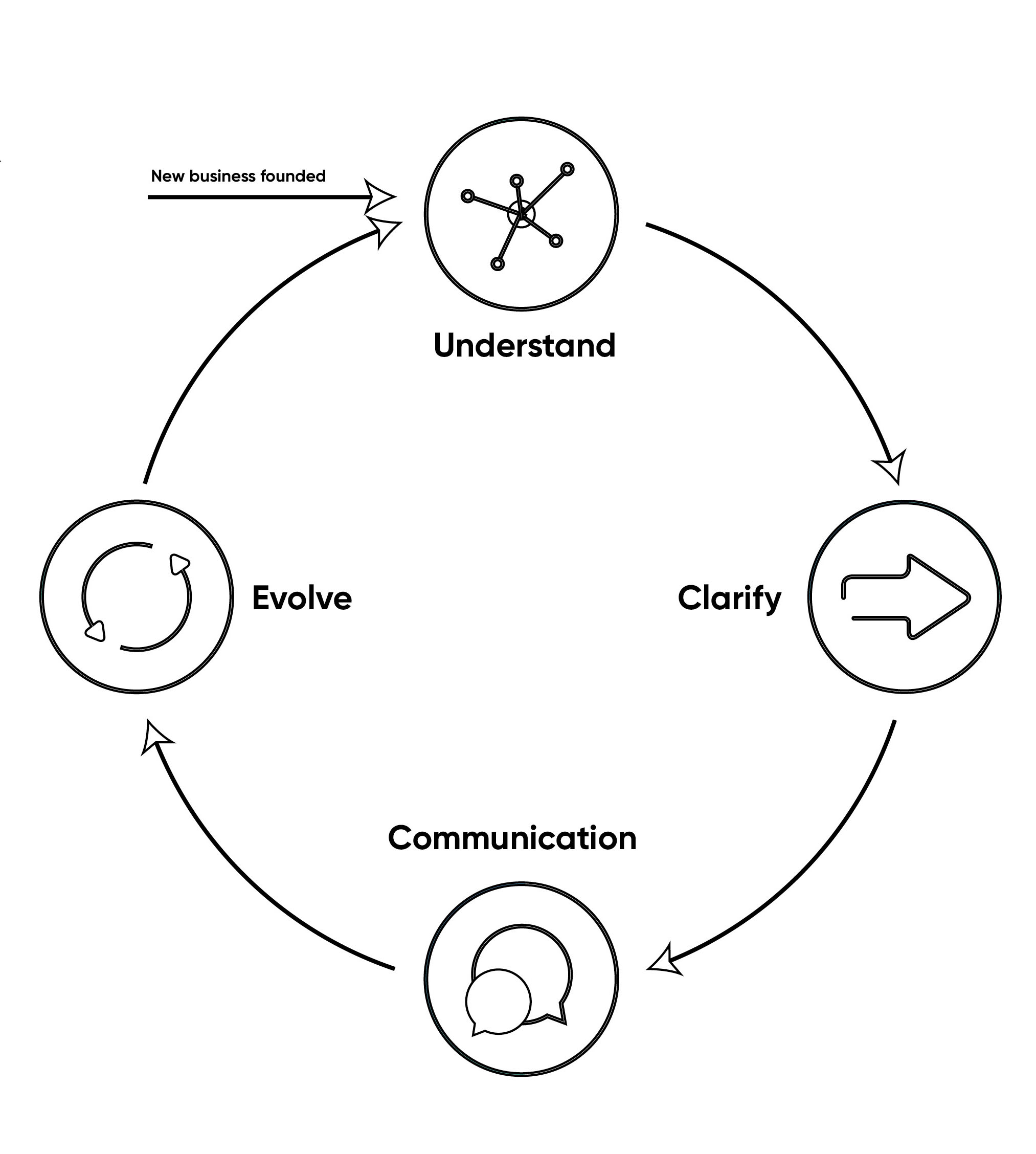
4. Evolutionary Brand Cycle
There are many models like this, but this is the one I use. It is a simple breakdown of a never ending process of evolution which every brand should constantly go through. Because, although we’ve just written a distillation of the brand, in reality the brand is always changing and shifting to a point. A brand is a dynamic entity which evolves over time. So, this model has four stages; Understanding, Clarifying, Communication, and Evolution. Understanding is your research phase. Clarifying is your distillation phase. Communication is your communicating phase. And Evolution is your listening phase. Keep doing these phases, over time, and your brand can shift and move at the right place and the right times.
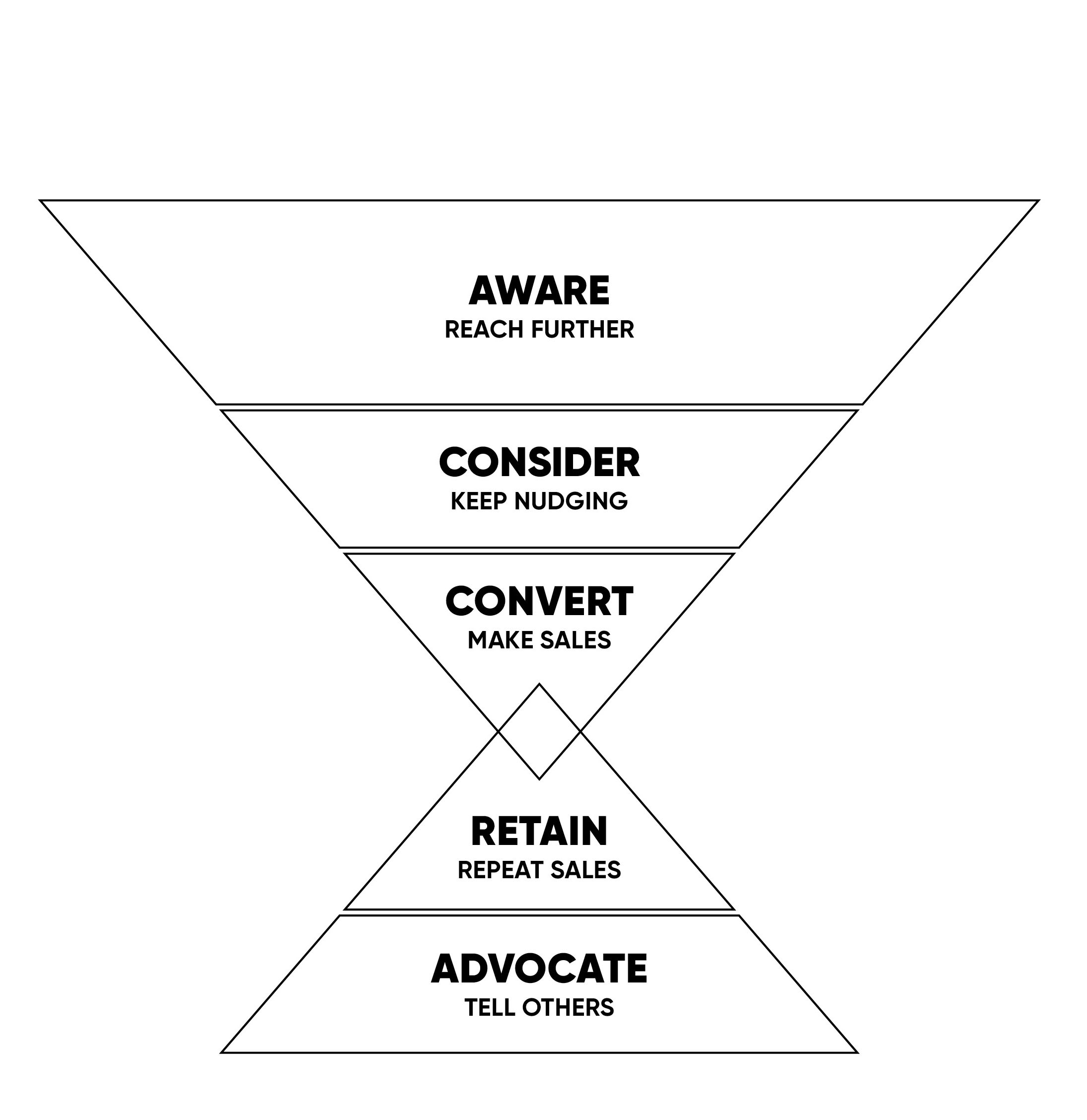
5. Marketing Sales Funnel
The Marketing sales funnel is yet another old and supposedly broken model. Not as far as I am concerned it isn’t. Now, my approach to the marketing sales funnel is quite loose, and we don’t put strict rules on how we use it. What we do find it useful for is assessing what marketing touchpoint should be used for which part of the journey through the funnel. At the top of the funnel we are looking at Awareness, and so touchpoints such as OOH and TVC will feature heavily. At the bottom of our funnel we have Advocacy, so Google Reviews or user reviews may feature here. Really, we find the funnel a helpful tool to give our touchpoints a role and responsibility.
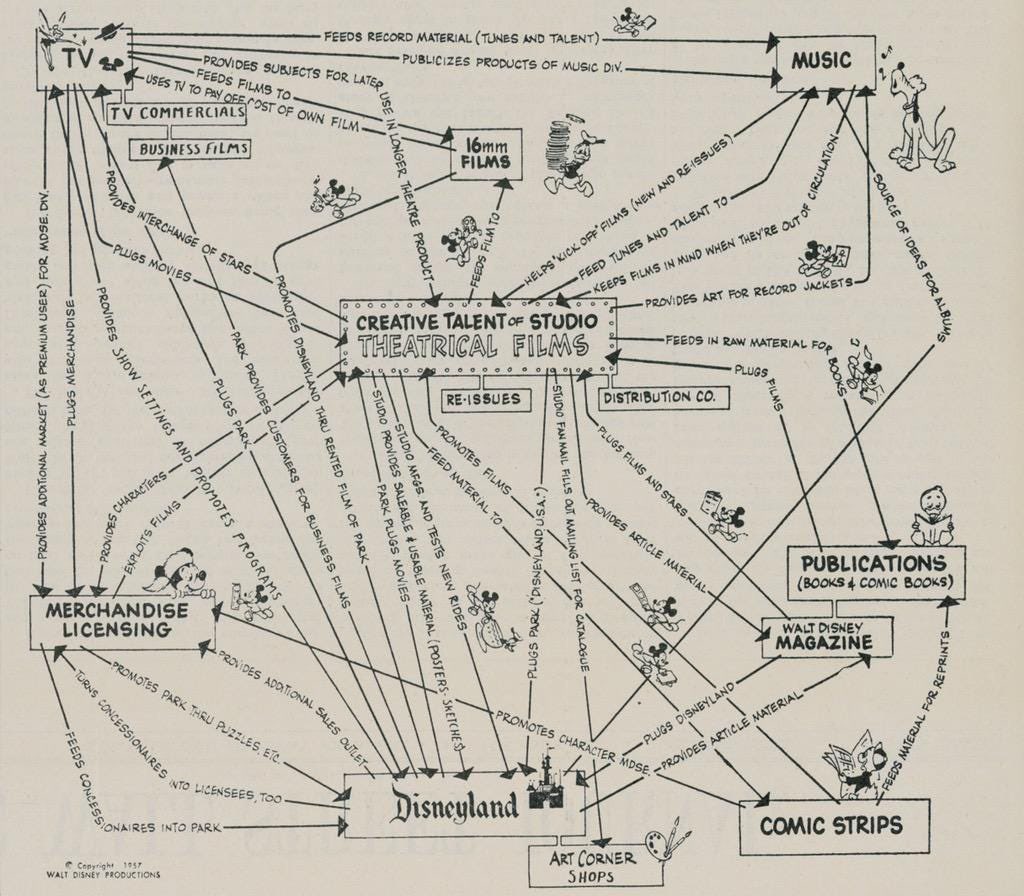
6. Experience Ecosystem
Finally, we move into the Experience ecosystem. What is this you might ask? Well, it is something that we do to give a function to every ‘moment’ a person comes into contact with our brand. A ‘moment’ is an audience-centered view of a touchpoint. Brands are shaped through ‘Associated Memorable Moments’, and every one of these moments in time should be used to encourage a desired action or reaction. Whether that action or reaction is just awareness of your brand, or is a driver to purchase, if you attribute a behavior you would like to encourage from that ‘moment’ you are creating a focus for everything you do. Make sure every moment is clearly identifiable as you, and is remembered for something you would like.
BJ Fogg’s Behavior Model is also useful here – motivation + ability + prompt = behavior.
So, there are six models I use pretty often. Of course, there are many more worth using. From Kapferer’s Brand Identity Prism to Keller’s Brand pyramid, Stephen King’s Planning Cycle to Kotler & Armstrong’s 3 Product Levels. But remember, a model is only there to help you cut and refine. It will never give you the answer, and what you get out is only ever as good as the quality of research you put into it. As I said at the beginning, there is a value in and a need for structure.
Contributed by: Paul Bailey, Strategy Director at Halo
There is an image of an advertising campaign poster making the rounds on social media that has been marked with comments that question the motives and manipulative methods behind the design (see below). It is a good example of social and cultural commentary being added onto a commercial poster, but it is far from a new idea.

Adbusters
The first time I became aware of this type of movement was in the 1990s, by a group called Adbusters. As a graphic design student, and taking great interest in designers such as Jonathan Barnbrook who were very social and counter-cultural in the work they did (and it turns out he was a part of Adbusters too), I was very interested in this movement. Although I didn’t join in with their activities, I followed them with some interest.
Adbusters have spent the 1990s, 2000s, 2010s, and the 2020s railing against capitalism and in particular advertising’s role in capitalism. Their magazine’s international circulation peaked at 120,000 in the late 2000s, but it has been their campaigns which have had more impact. Buy Nothing Day, TV Turnoff Week and Occupy Wall Street have all left their mark, but they are probably best known for their “subvertisements” — adverts which subvert the original message of the advert.
Blaming advertising for playing a central role in creating and maintaining consumer culture, they have used the creative skills and talents against advertising itself. They claim to be combating the negative effects of advertising and empowering its readers to regain control of culture. The big question they ask with all of their work is “Are we consumers and citizens?”
Citizen or consumer?
This is something I believe is an important discussion that those of us who work with brands need to have — are we creating enough space for people to be citizens as well as consumers? This is a big question, and one that brings other factors into play such as ‘brand purpose’ — is a corporate brand the best vehicle to promote a social or environmental purpose — but that is for another article.

Adbusters might have blazed the trail, but now groups such as Brandalism are picking up the ball and sprinting with it. Emerging in the UK during the 2012 Olympics, Brandalism has been using ‘culture jamming’ to rail against corporations with anti-capitalist, anti-consumerist and environmental concerns. Brandalism has also done a lot to expand the people who are able to take part in these activities, by among other things publishing ‘how to’ guides for things like opening poster sites.
Cultural landscape
Now, there are some who are against all of these ‘subvertising’ activities, but that isn’t my view. For me, they are an important addition to the cultural landscape, and can be a valid challenge to corporate power. On top of that, I think that some of the Adbusters and Brandalism work is some of the most creative work out there. Not only are advertising companies getting their work busted, it’s being improved upon at the same time.
If you’re interested in finding out more about this subculture, take a look at the books and websites below.
‘Advertising Shits in Your Head‘ by Vyvian Raoul & Matt Bonner
‘Culture Jam’ by Kalle Lasn
The tech industry is fascinating from a brand perspective. Its growth has been so fast, disruptive and organic, with so many quickly expanding start-ups, that it has barely had time to pause and draw breath, let alone ponder what role brand might have to play in its future. When your numbers are good, something like brand scarcely seems to matter. Most companies have thrived despite, rather than because of theirs. But the hour of reckoning may be near.
In all industries there comes a point when it isn’t enough to have a great product or service to build a successful business. Knowledge spreads and grows. What once was groundbreaking rapidly becomes standard, imitable, improvable… the marketplace crowds and alternatives proliferate. Your ability to communicate your difference and your real value becomes ever more important as competition intensifies. Which is what makes the current situation in tech, digital and data analytics so interesting. With a plethora of similar-looking brands that use familiar language, the sector has evolved into a homogeneous playing field. The overwhelming sense is that everyone looks and sounds extraordinarily similar. That, for the wise, presents a far bigger opportunity than a few more lines of groundbreaking code.
It’s easy to see how things have come to be the way they are. All that mattered at the outset was the innovation. Companies started small and agile. Many really struggled to keep pace with their own success. Brand was often lumped in with digital marketing, handed to less senior people to take care of, and frequently seen as superficial – “just a logo” – and therefore low priority. The great thing about digital marketing from a digital company’s point of view? It’s easy to measure. Brand, which is bigger in every way, less so. All this is understandable: companies had people to hire, products to develop and customers to deal with. Even many who understand the importance of brand have simply put it off.
But now the situation has evolved. Many of those companies that started with two or three people now number twenty or thirty or substantially more. Now internal purpose, morale, discipline, decision-making and behaviour weighs heavier: bigger overheads, bigger clients, bigger responsibilities… each new step carries greater implications. How do you keep this ever-growing number of people together as a meaningful entity? Who exactly are you, as an organisation? What do you actually stand for?
The questions keep coming. How will you thrive consistently in the tech big battleground that is the fight for talent, when demand outstrips supply? What’s going to make high quality people choose you, instead of a close rival, for their next job, so you can maintain the high standards of the work you do as it scales up? Your good name and future business rests on it. And how, when you know that your product is better than your lookalike rivals out there, are you going to convince potential customers of that? How will they know who to believe? What’s going to get you the market share your innovation undoubtedly deserves?
Decisions going your way is the answer to these questions – and all of the great myriad of micro-influences that lead to that. But it’s easier said than done. The science of decision-making is fairly well documented. We’re not such rational beings as we’d like to believe, with up to 90 percent of the choices we make based on emotion… and later post-rationalised. This is just as applicable to tech as it is to buying chocolate in the supermarket or choosing a house. Instinctive decisions are made before we even know it ourselves. And this is where a brand – when it’s done well – comes into its own.
A brand isn’t simply a logo, a strapline, colours, imagery, fonts – it’s the sum of how all these are orchestrated, plus the behaviours and feelings that this leads to. It’s the whole experience of your organisation at every moment it has contact with someone. It’s the sum of every gesture and action by every employee as well as every facet of every piece of communication. A smart brand is alive to possibilities not just online or through marketing but anywhere there is engagement or the opportunity to bring its big core idea to life. Why can’t you make someone smile when they least expect it, in – say – the company car park for example? A brand is how you make your customers (and your own people) feel, which influences their behaviour towards you. And that’s why it’s a key strategic tool. The right thinking now can shape big, big decisions later. This is not a slap of paint.
To return to the tech sector in particular. It tends to be the case that tech companies focus intensely on what they have developed. It’s what they know, it’s where they feel comfortable. But what do they – or you – really know of the person who says yes or no to you, the key decision-maker with the final word? Or of what goes into that decision? Are you sure the technology itself is even within the grasp of this individual? Does it even need to be? Perhaps what matters for them is simplicity, ease of use, an instant sense of reliability and effectiveness: impact. Often, it’s not until much further down the line that verification of the tech offer is sought – usually by someone else, long after the important decision has been made. It’s no coincidence that so many tech businesses only thrive when they become human, literally, in the form of a meeting or presentation. If that’s the only time your “brand” is alive – then you don’t have a brand at all.
The fact is that many businesses in the tech sector focus their communications around dry, technical language set against a visual backdrop of technology cliches or familiar-looking process diagrams. Whilst it might be a necessity to articulate the nitty gritty of a technology, platform or service somewhere, this is often given priority at the expense of the wider, more human and beneficial story. Complexity stymies simplicity. Many businesses are missing the opportunity to connect their brand with customers in a much more powerful way.
So what can (great) branding do for you:
— Revolutionise credibility
— Influence the big decisions people are making about your company
— Improve your talent acquisition
— Support your business strategy
— Radically alter morale and engagement internally
— Increase business leads and new business / revenue
— Inform strategic decisions
— Bring stability and reassurance through demanding times
— Drive IPO or sales valuations higher
— Change the future.
Ragga’s founder spotted a rise in popularity of Tonic Wine, but having grown up around these drinks, he wasn’t convinced that the options out there were doing the category justice.
This was a challenge he took very seriously…it took a whole year of product mixing and testing to satisfy his tastebuds – but the dedication paid off.
Say hello to the delicately smooth, flavour infused Tonic Wine that is Ragga.
Such dedication to getting the product right deserves a powerful brand identity and eye-catching packaging design to support it, and that’s where Episode Two came in. We’ve loved bringing the vision of Ragga to life. Creating a brand which resonates with the new younger Tonic Wine audience, whilst staying true to its Jamaican roots.
It’s all about the Taste, and all about the Vibes!
This is just the beginning for Ragga. Follow their journey @raggatonic on Instagram
Find out more about this project here
You need to load content from reCAPTCHA to submit the form. Please note that doing so will share data with third-party providers.
More InformationNotifications